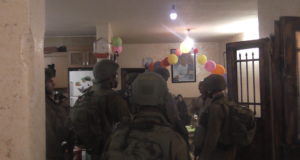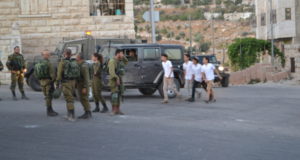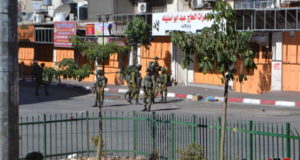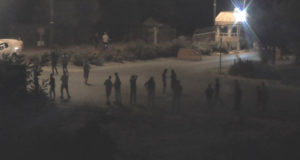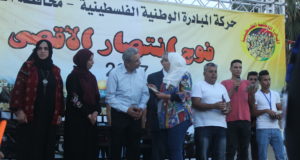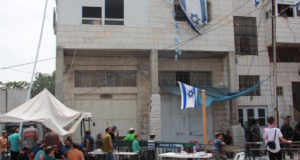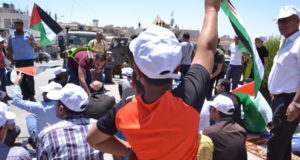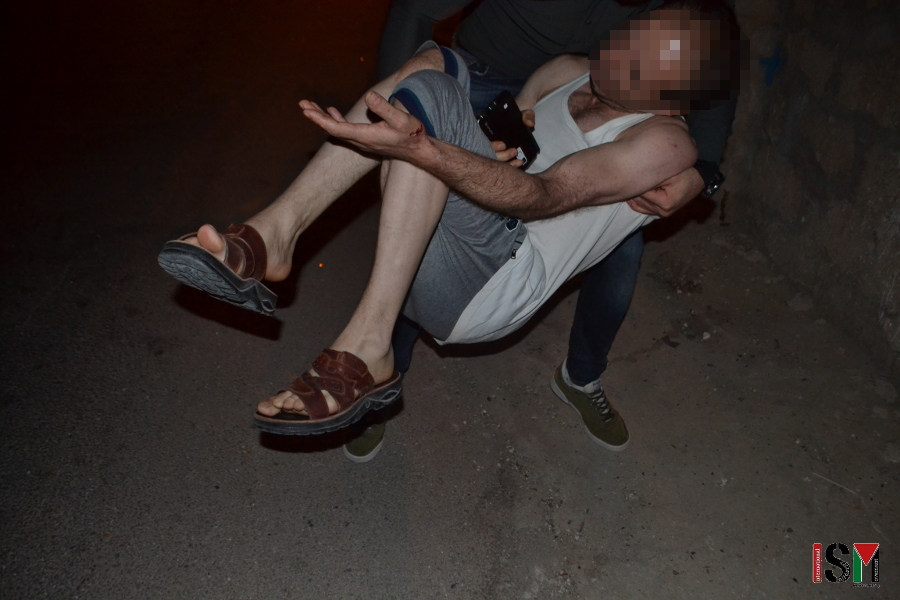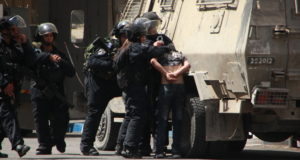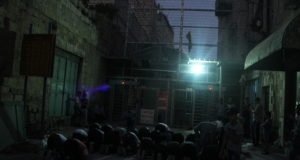21st August 2017 | International Solidarity Movement, al-Khalil team | Hebron, occupied Palestine On August 9th Israeli occupation forces invaded a home in occupied al-Khalil (Hebron). The soldiers came in the early hours at 01 am and stayed inside the ...
Read More »Heavy military presence on important road in Hebron
20th August 2017 | International Solidarity Movement, al-Khalil team | Hebron, occupied Palestine On Friday evening the Al Khalil team surveyed the intersection of prayer road. The route leading north towards the illegal settlement Kiryat Arba had Israeli soldiers posted ...
Read More »Friday protest in occupied Hebron
20th August 2017 | International Solidarity Movement, al-Khalil team | Hebron, occupied Palestine Last Friday, 18th of August, during a protest in front of checkpoint 56 in Hebron, a group of young Palestinians were demonstrating against the illegal occupation of ...
Read More »Settler violence continues in occupied al-Khalil
7th August 2017 | International Solidarity Movement | Al-Khalil team, Occupied Hebron On the evening of Saturday 5th August, a group of 30 to 50 settlers aged between 15 and 30 years old from the illegal settlement of Kiryat Arba entered ...
Read More »Palestinian schoolchildren celebrate graduation in al-Khalil
5th August 2017 | International Solidarity Movement, Al-Khalil team | Hebron, occupied Palestine Palestinian children celebrated graduation yesterday in the occupied city of al-Khalil (Hebron). The occasion was marked by a cultural festival, organised by the Palestinian National Initiative. The ...
Read More »Settlers illegally occupy a Palestinian house in Hebron
6th August 2017 | International Solidarity Movement, al-Khalil team | Hebron, occupied Palestine On Tuesday 25th of July some 50 Israeli settlers illegally occupied a Palestinian house in illegal occupied Al-Khalil (Hebron) in H2 in an attempt to take control ...
Read More »Israeli occupation forces attack peaceful sit-in demonstration in Khursa near Dura village [VIDEO]
4th August 2017 | International Solidarity Movement, Al-Khalil team | Hebron, occupied Palestine On Friday 4th of August in the village of Khursa in occupied Al-Khalil (Hebron), the residents gathered for a peaceful sit-in demonstration and Friday prayer against the ...
Read More »Settler attack towards Palestinians in occupied al-Khalil (Hebron) [VIDEO]
4th August 2017 | International Solidarity Movement, al-Khalil team | Hebron, occupied Palestine Friday 4th of August after the Shabbat prayers (Kabbalat Shabbat), approximately 40/50 settlers attacked Palestinians on Prayer Road by using verbal violence and throwing stones, 3 Palestinians ...
Read More »Israeli forces violently repress Al-Aqsa solidarity demonstration in al-Khalil (Hebron) [VIDEO]
30th July 2017 | International Solidarity Movement, Al-Khalil team | Hebron, occupied Palestine An Al-Aqsa solidarity march organized this Friday in occupied Hebron was heavily repressed by Israeli Forces. Soldiers and border police fired stun grenades, teargas, putrid-smelling “skunk” water, ...
Read More »Israeli forces attack peaceful demonstration in occupied al-Khalil (Hebron)
29th July 2017 | International Solidarity Movement, al-Khalil team | Hebron, occupied Palestine Israeli forces on Thursday night, 27th July, attacked a peaceful demonstration which was taking place outside Shuhada checkpoint, which leads to Shuhada street in occupied al-Khalil (Hebron) ...
Read More » International Solidarity Movement Nonviolence. Justice. Freedom.
International Solidarity Movement Nonviolence. Justice. Freedom.
